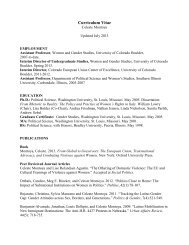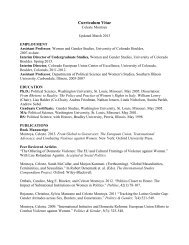Are you a man?: Performing Naked Protest in India - Women and ...
Are you a man?: Performing Naked Protest in India - Women and ...
Are you a man?: Performing Naked Protest in India - Women and ...
You also want an ePaper? Increase the reach of your titles
YUMPU automatically turns print PDFs into web optimized ePapers that Google loves.
612 ❙ Misri<br />
I turn to that discussion, however, I wish to pause briefly over some of<br />
Sabitri’s other perfor<strong>man</strong>ces <strong>in</strong> the early 2000s, which are also relevant,<br />
if less obviously so, to the discursive milieu <strong>in</strong> which the women’s protest<br />
took place. Interest<strong>in</strong>gly, the tactile body of this performer itself comes<br />
to be a site of transmission for some of the diverse traditions of representation<br />
around women’s nakedness <strong>in</strong> <strong>India</strong>, across various sites of fem<strong>in</strong>ist<br />
cultural perfor<strong>man</strong>ce. While the commitment to physicality over the<br />
verbal among Kanhailal’s actors has sometimes been critiqued, it also<br />
renders their perfor<strong>man</strong>ces mobile across regional <strong>and</strong> l<strong>in</strong>guistic boundaries<br />
<strong>and</strong> possibly expla<strong>in</strong>s Sabitri’s cast<strong>in</strong>g <strong>in</strong> projects seek<strong>in</strong>g to specifically<br />
explore the construction of mean<strong>in</strong>g around women’s bodies. 13<br />
In 2000, Sabitri appeared <strong>in</strong> Madhushree Dutta’s Scribbles on Akka<br />
(2000), a documentary that explores the contemporary relevance for<br />
women of the twelfth-century, naked bhakt<strong>in</strong> sa<strong>in</strong>t Akka Mahadevi. 14 Akka,<br />
one of the several women poets <strong>in</strong> the Vaishnavite bhakti tradition, was<br />
said to have renounced her cloth<strong>in</strong>g along with conjugal life when she<br />
declared herself wedded to the Lord Shiva. W<strong>and</strong>er<strong>in</strong>g naked thereafter,<br />
she composed the devotional verse (vachanas, much of which thematized<br />
her decision to be naked <strong>and</strong> without shame) through which she has<br />
endured for over eight centuries <strong>in</strong> South <strong>India</strong>, where she cont<strong>in</strong>ues to<br />
be revered today, <strong>and</strong> <strong>in</strong> the Vaishnavite tradition more broadly. 15 Indeed,<br />
not only has Sabitri played both Draupadi <strong>and</strong> Akka—two ur-figures of<br />
female nakedness <strong>in</strong> the H<strong>in</strong>du imag<strong>in</strong>ation <strong>in</strong> <strong>India</strong>—but <strong>in</strong> 2001 she<br />
played Draupadi at the Akka Theatre Festival <strong>in</strong> Mysore, a women’s theater<br />
13<br />
Rustom Bharucha, for <strong>in</strong>stance, f<strong>in</strong>ds that the emphasis on physicality <strong>and</strong> nonverbalism<br />
<strong>in</strong> Kanhailal’s actors comes “at the expense of confront<strong>in</strong>g the spoken word” (Bharucha 1991,<br />
751).<br />
14<br />
The bhakti movement began <strong>in</strong> the sixth century <strong>in</strong> South <strong>India</strong> as a movement that<br />
attempted to democratize religion by question<strong>in</strong>g the Brahm<strong>in</strong>ical stronghold over H<strong>in</strong>du<br />
religious practice. As Madhu Kishwar (1989) po<strong>in</strong>ts out, by mov<strong>in</strong>g the language of worship<br />
from Brahm<strong>in</strong>ical Sanskrit to colloquially spoken languages the movement allowed for the<br />
expression of women’s creativity <strong>in</strong> devotional discourse.<br />
15<br />
Incidentally, most of the Meitei, Manipur’s majority ethnic group to which the naked<br />
protesters belong, are Vaishnavite H<strong>in</strong>dus. Like Akka <strong>in</strong> the Vaishnavite tradition, the fourteenthcentury<br />
Kashmiri bhakt<strong>in</strong> Lal Ded also renounced domestic life <strong>and</strong> discarded cloth<strong>in</strong>g. In Scribbles<br />
on Akka (2000), two women retell the myths around Akka’s nakedness <strong>in</strong> a way that seems<br />
to be clearly mediated through the Draupadi myth. As the popular legend goes, when Akka<br />
rejects a proposal of marriage from the k<strong>in</strong>g Kaushika, he attempts to strip her; she then<br />
sheds her clothes herself <strong>and</strong> from that moment on, it is said, w<strong>and</strong>ers alone naked. But <strong>in</strong><br />
the two women’s tell<strong>in</strong>g of the legend, Akka prays to the lord (Chennamallikarjuna) for<br />
rescue <strong>and</strong> grows a heap of hair that covers her as she is be<strong>in</strong>g stripped—a (male) godly<br />
<strong>in</strong>tervention that echoes clearly the mythological Draupadi’s endless sari.






